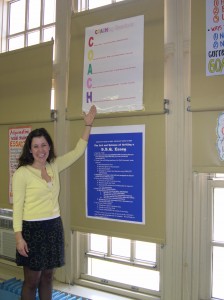 The objective of a teacher as coach is to elicit responses that reflect how well cooperative groups or a student is progressing. The questions should be open-ended, probing for as much detail and description as possible. This strategy can also be used during professional development.
The objective of a teacher as coach is to elicit responses that reflect how well cooperative groups or a student is progressing. The questions should be open-ended, probing for as much detail and description as possible. This strategy can also be used during professional development.
 Teachers such as Kim Trettor and Lydia Caprarella have the acronym and its definition posted on the wall so that peers in cooperative groups can help each other. COACH, the acronym, stands for Clarity of task, Ownership, Attentive, Comprehension, and checking for Heightened or Hidden emotions. Questions or statements that Kim and Lydia pose while circulating to each cooperative group are:
Teachers such as Kim Trettor and Lydia Caprarella have the acronym and its definition posted on the wall so that peers in cooperative groups can help each other. COACH, the acronym, stands for Clarity of task, Ownership, Attentive, Comprehension, and checking for Heightened or Hidden emotions. Questions or statements that Kim and Lydia pose while circulating to each cooperative group are:
C = Clarity of Task: Please explain to me in your own words what you need to accomplish. Explain specifically what you have decided to do.
O = Ownership: How have you decided to divide the responsibility? For what reasons do you feel that this is fair in terms of your workload?
A = Attentive: Please share with me what you have been able to accomplish thus far today. Describe in detail how well you think you are working as a group. In what ways is this relevant to what you are trying to achieve together?
C = Comprehension: Please show me where you found this information because I find it fascinating. Please explain the most important points that you found in your research. For what reasons does this information make sense to you? For what reasons do you think you can make the connection?
H = Heightened or Hidden Emotions: I noticed that there is very little discussion at this table. Please share with me how you feel your group is functioning right now. It appears that this group has divided itself into pairs. Please describe what has taken place.
|
By asking COACHing questions, Kim and Lydia inspire students to probe deeper, rather than becoming defensive where they feel inadequate. It also allows them to become part of the inquiry process, where they model that they are not the sole repositories of all knowledge, but are interested primarily in their students’ unique research and projects. As students take risks and try new endeavors, it is important for the teacher to guide them and facilitate learning in a positive fashion. By prompting students with specific questions that initiate scholarship, teachers allow students to think critically and apply multiple perspectives. When the teacher abandons the phrase “should have” and replaces it with “May I suggest,” “You may want to consider,” or “In what ways can you…” the responsibility takes a major shift from the teacher to the students (Crane, 2002). This offers students the choice to respond to the needed change.
![]() After having taught this strategy to your staff at a staff meeting or to your students in the classroom, in what ways did it help them become better cooperative group participants?
After having taught this strategy to your staff at a staff meeting or to your students in the classroom, in what ways did it help them become better cooperative group participants?
![]()
For professional development at your school, click here.
(c) 2012 Andi Stix, Ed.D. and PCC
Andi Stix is an educational consultant & coach who specializes in differentiation, interactive learning, writing across the curriculum, classroom coaching, and gifted education. For further information on her specialties or social media, please email her on the Contact page.
References
Crane, T. The heart of coaching: Using transformational coaching to create a high-performance culture.San Diego, CA: FTA Press.
Eisner, E. (2005). Back to whole. Educational Leadership, (63)1, 14-17.
Guarino, M. (2004, Feb 13th). Empty nesters find purpose and motivation: The action step guide once the children leave. SparkPeople.Cincinnati, OH: SparkPeople, Inc.
iPEC: Institute for Professional Empowerment Coaching (1999, 2005). Coach training manual.Manasquan, NJ: iPEC.
Kohn, A. (2005). Unconditional teaching. Educational Leadership, (63)1, 20-24.
Longenecker, C. & Pinkel, G. (1997). Coaching to win at work. Manage, 48(2), 19-21.
Marklein, M. B. (2005, Oct. 12th). College kids get coached up. USA Today. McLean, VA: Gannett Co., Inc.
Stix, A. (Fall 2000). Negotiable contracting. Gems of AGATE Newsletter. 24(3). NY: Advocacy for Gifted and Talented Education in inNew YorkState.
Wright, K. (1998). Breaking the Rules: Removing the obstacles to effortless high performance. Boise, Idaho: CPM Publishing.
Zeus, P. and Skiffington, S, (2001). The complete guide to coaching at work. NY: McGraw-Hill Education.





